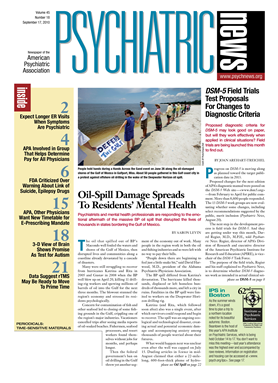Repetitive transcranial magnetic stimulation (rTMS) might be ready for use as a clinical treatment in psychiatry, not just as an experimental treatment, according to a meta-analysis of studies of the procedure's efficacy by Dutch researchers.
They found that it appears to be an effective and safe treatment alternative for depression and auditory hallucinations but not for obsessive-compulsive disorder. They reported their findings in the July Journal of Clinical Psychiatry.
Christina Slotema, M.D., of the Parnassia Bavo Psychiatric Institute in The Hague, the Netherlands, and her colleagues searched the scientific literature from 1990 to 2008 for studies that had explored the value of rTMS for treating depression, auditory hallucinations, the negative symptoms of schizophrenia, or obsessive-compulsive disorder. They found 34 randomized sham-controlled studies that had evaluated rTMS for treating depression, seven that had evaluated it for treating auditory hallucinations, seven that had evaluated it for treating negative symptoms of schizophrenia, and three that had evaluated it for treating obsessive-compulsive disorder. They then computed the standardized mean effect sizes of rTMS versus sham in depression, auditory hallucinations, negative symptoms, and obsessive-compulsive disorder based on pre- and post-treatment comparisons.
In treatment of depression, rTMS had a mean weighted effect size of 0.55, which was highly significant and also high when compared with effect sizes commonly reported for pharmacotherapy in depression (that is, between 0.17 and 0.46).
In the treatment of auditory hallucinations, rTMS had a mean weighted effect size of 0.54, which was also highly significant.
In treating negative symptoms of psychosis, the mean weighted effect size for rTMS was 0.39, and in the treatment of obsessive-compulsive disorder, it was 0.15, neither of which was statistically significant.
The researchers also evaluated the side effects produced by rTMS in the various studies—headache, scalp discomfort, drowsiness, and nausea were among the most common—but found that they were mild and transient and occurred mostly in frontal locations.
“It is time to provide rTMS as a clinical treatment method for depression, for auditory verbal hallucinations, and possibly for negative symptoms,” Slotema and her coworkers concluded. “We do not recommend rTMS for the treatment of obsessive-compulsive disorder.”
“I would say that their recommendation to move toward clinical use for depression and auditory hallucinations is reasonable based on the meta-analyses reported,” Ralph Hoffman, M.D., a professor of psychiatry at Yale University and an expert on treating auditory hallucinations with rTMS, told Psychiatric News. “Having said that, I will also add that we are still in an early stage of understanding the mechanisms of action of rTMS as well as the mechanisms of illness conditions that are targeted. On the other hand, we should anticipate further advances in these areas, as well as improved technology allowing deeper cortical penetrance and selective alteration of function in critical cortical and subcortical circuits via rTMS.”
Moreover, the safety/tolerability profile of rTMS compares favorably with those for medications and ECT, “which is an important plus,” Hoffman pointed out. “Factors such as age, [use of] concomitant medications, chronicity, and severity of symptoms that are likely to mediate response need to be better characterized.” He added that both cost and durability of treatment effects will also be determinants of the clinical acceptance of rTMS as a psychiatric treatment.
In 2008, the Food and Drug Administration cleared rTMS for treating major depressive disorder in adult patients who had failed to achieve satisfactory improvement from one prior antidepressant medication.
The meta-analysis was funded by the Dutch Scientific Research Foundation, Dutch National Institutes of Health Research, and Dutch Support Foundation.
An abstract of “Should We Expand the Toolbox of Psychiatric Treatment Methods to Include Repetitive Transcranial Magnetic Stimulation (rTMS)? A Meta-Analysis of the Efficacy of rTMS in Psychiatry Disorders” can be accessed at <www.psychiatrist.com> by clicking on the July issue. 
